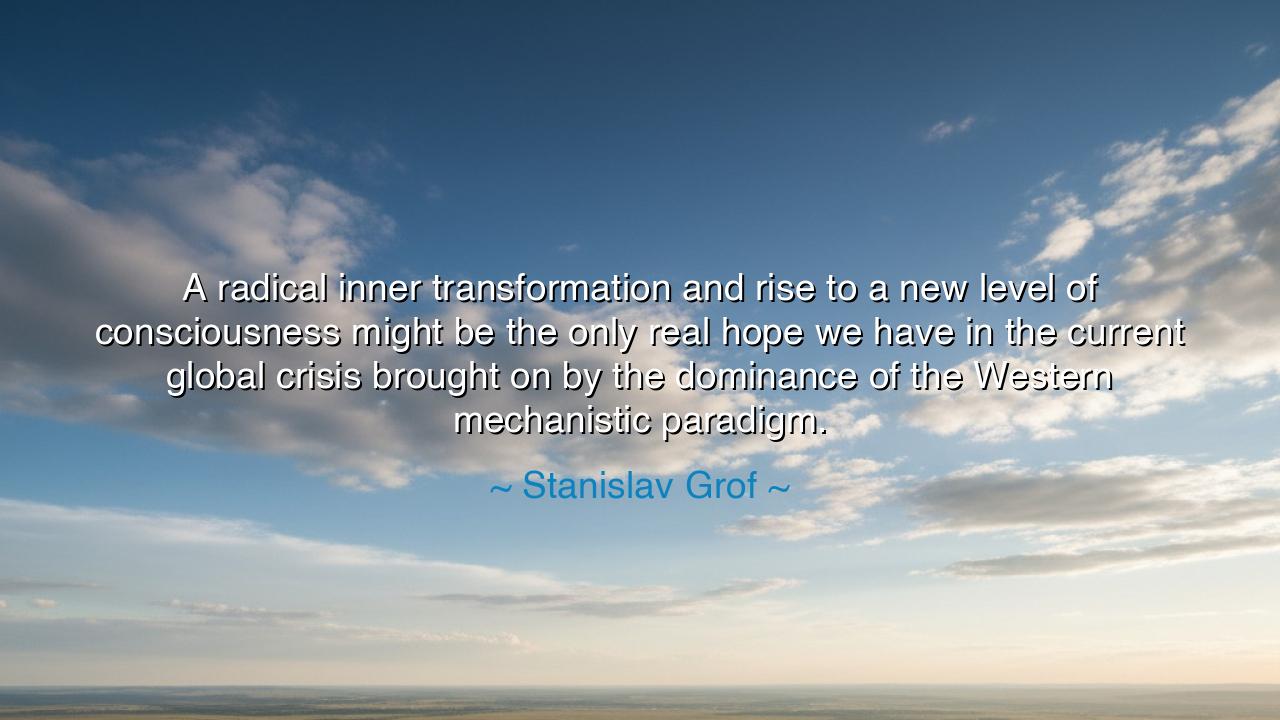
A radical inner transformation and rise to a new level of
A radical inner transformation and rise to a new level of consciousness might be the only real hope we have in the current global crisis brought on by the dominance of the Western mechanistic paradigm.






“A radical inner transformation and rise to a new level of consciousness might be the only real hope we have in the current global crisis brought on by the dominance of the Western mechanistic paradigm.” Thus spoke Stanislav Grof, a seeker of the hidden realms of the human spirit, a man who looked not outward to the machines of steel and commerce, but inward to the vast universe within. His words are a cry from the heart of wisdom—a warning and a promise—that unless mankind changes within, no progress without will save it. For all our towers of technology, all our engines of industry, all our triumphs of reason—these are but hollow shells if the soul that drives them remains unawakened.
To understand Grof’s call for a radical inner transformation, one must first behold the sickness he names: the mechanistic paradigm. This is the vision of the world as a machine—cold, divided, soulless. It is the belief that man is but a collection of parts, that nature is a tool, that meaning is an illusion, and that progress lies only in material conquest. Such thinking has built great cities and sent fire into the heavens, but it has also left hearts barren, forests dying, and rivers poisoned. Grof saw that the crisis of our age—the global crisis of greed, alienation, and despair—is not merely political or environmental; it is spiritual.
The ancients knew better. They saw the cosmos not as a machine but as a living being, pulsing with divinity. The Egyptians called it Ma’at, the order of balance; the Hindus spoke of Brahman, the eternal spirit that breathes through all things; the Stoics of Greece believed in the Logos, the divine reason woven through creation. To them, man was not separate from nature—he was a thread in its sacred tapestry. But the Western mechanistic worldview, born from the age of reason and conquest, severed that thread. It gave us power over the world, yet robbed us of communion with it.
Grof’s message is not despair but revelation. He reminds us that the path forward lies not in more machines, but in consciousness—in awakening the deep capacities of the human spirit. He calls for an inner revolution, a rise to a new level of awareness, where we no longer see ourselves as isolated fragments, but as expressions of one infinite whole. This transformation is radical because it demands the death of the small self—the ego that seeks control—and the birth of the greater Self that seeks harmony.
Consider the story of Mahatma Gandhi, who stood against an empire not with armies, but with inner strength. He understood that true change does not come from overthrowing systems alone, but from transforming the hearts of those who sustain them. Through his own inner discipline—his simplicity, his prayer, his fasting—he became the very embodiment of the change he wished to see. His revolution was not of blood, but of spirit. Gandhi, like Grof, knew that the outer world mirrors the inner one, and that only by transforming the latter can the former be healed.
The rise to a new level of consciousness that Grof speaks of is not a flight from the world, but a deeper return to it. It means living with reverence for life, feeling the pain of the earth as one’s own, and recognizing that every act—however small—echoes across the web of existence. It means embracing the mystery that the mind cannot measure, and trusting that love, not logic, is the higher law. Such awakening may seem mystical, yet it is the most practical thing of all—for without it, the hands that build will also destroy, and the minds that invent will forget why they create.
Let the lesson be this: no civilization can be sustained by machinery alone. The heart must evolve alongside the hand. The wisdom of Grof’s words is a summons to each of us—to meditate, to feel, to question, to awaken. The true revolution of our time will not be waged in streets or screens, but in the silent chambers of the soul. Each person who opens their awareness adds light to a world dimmed by material blindness.
So, take this teaching as the ancients took prophecy: not as comfort, but as duty. Cultivate your inner life as diligently as you cultivate your work. Seek balance where there is haste, empathy where there is competition, stillness where there is noise. For when enough hearts awaken—when consciousness itself ascends—the mechanistic age will dissolve like mist before the dawn. And then, from the depths of that new awareness, humanity will remember its true purpose: not to master the world, but to belong to it.






AAdministratorAdministrator
Welcome, honored guests. Please leave a comment, we will respond soon